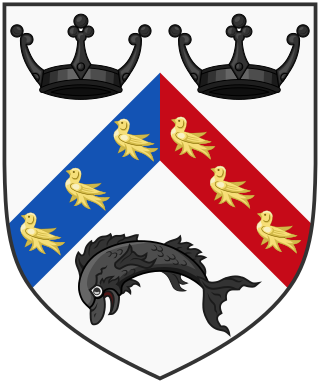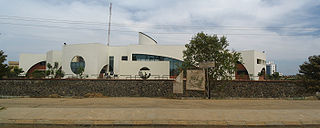
The University of Sussex is a public research-intensive university located in Falmer, East Sussex, England. It lies mostly within the city boundaries of Brighton and Hove. Its large campus site is surrounded by the South Downs National Park, and provides convenient access to central Brighton 5.5 kilometres (3.4 mi) away. The university received its royal charter in August 1961, the first of the plate glass university generation.

The University of Southampton is a public research university in Southampton, England. Southampton is a founding member of the Russell Group of research-intensive universities in the United Kingdom, and ranked in the top 100 universities in the world.

The University of Jyväskylä is a research university in Jyväskylä, Finland. It has its origins in the first Finnish-speaking Teacher Training College, founded in 1863. Around 14,000 students are currently enrolled in the degree programs of the university.

The University of Leicester is a public research university based in Leicester, England. The main campus is south of the city centre, adjacent to Victoria Park. The university's predecessor, University College, Leicester, gained university status in 1957.

Loyola College is a private Catholic higher education institution run by the Society of Jesus in Chennai, Tamil Nadu, India. It was founded in 1925 by the French Jesuit priest, Francis Bertram, along with other European Jesuits. It is an autonomous Jesuit college affiliated with the University of Madras. Loyola commerce association celebrated its 75th year in 2019. Loyola College has more than 8000 students studying as of 2021.

Cochin University of Science and Technology (CUSAT) is a state government-owned autonomous university in Kochi, Kerala, India. It was founded in 1971 and has three campuses: two in Kochi and one in Kuttanad, Alappuzha, 66 km (41 mi) inland. The university awards degrees in engineering and science at the undergraduate, postgraduate and doctoral levels.

The Cardiff University School of Medicine is the medical school of Cardiff University and is located in Cardiff, Wales, UK. Founded in 1893 as part of the University College of South Wales and Monmouthshire, it is the older of the two medical schools in Wales.

The University of Brasília is a federal public university in Brasília, the capital of Brazil. It was founded in 1960 and has since consistently been named among the top five Brazilian universities and the top fifteen universities in South America by Times Higher Education (THE).

Chennai Mathematical Institute (CMI) is a higher education and research institute in Chennai, India. It was founded in 1989 by the SPIC Science Foundation, and offers undergraduate and postgraduate programmes in physics, mathematics and computer science. CMI is noted for its research in algebraic geometry, in particular in the area of moduli of bundles.

East West University, is a private university located in Aftabnagar, Dhaka of Bangladesh. It was established in 1996 under the Private University Act of 1992.
The Doctor of Engineering is a professional doctorate in engineering and applied science. An EngD is a terminal degree similar to a PhD in engineering but applicable more in industry rather than in academia. The degree is usually aimed toward working professionals.

Vidya Academy of Science and Technology (VAST) is a privately financed engineering college in Thrissur District in Kerala. The college offers a degree in Bachelor of Technology and courses in six branches of engineering - Production, Civil, Computer Science, Electrical and Electronics, Electronics and Communication, Mechanical. The college also offers a degree in Masters in Computer Application (MCA). From the year 2011, the college has offered four MTech courses and two PhD programmes in Electrical engineering & Computer science engineering. The college was established and is administered by Vidya International Charitable Trust (VICT), a body formed by more than a thousand non-resident Keralites mostly based in the Arab States of the Persian Gulf.
The Harish-Chandra Research Institute (HRI) is an institution dedicated to research in mathematics and theoretical physics, located in Prayagraj, Uttar Pradesh in India. Established in 1975, HRI offers masters and doctoral program in affiliation with the Homi Bhabha National Institute.
The ICG is a research institute at the University of Portsmouth devoted to topics in cosmology, galaxy evolution and gravitation. It has nearly 50 staff, post-docs and students working on subjects from inflation in the early Universe to understanding the stellar populations in galaxies.

The Australian College of Optometry (ACO) is an Australian non-profit working to improving the eye health and well-being of various Australian communities. Established in 1940, the ACO's goal is to deliver public health optometry, vision research and professional education.

The Eastern Academic Research Consortium, or "Eastern Arc", is a regional research collaboration between the University of East Anglia, the University of Essex, and the University of Kent. The three partner institutions are all part of the "plate glass universities" established in the 1960s.

Indian Institute of Technology Tirupati is an autonomous engineering and technology education institute located in Tirupati, Andhra Pradesh. Initially mentored by IIT Madras, now IIT Tirupati, the fastest growing 3rd generation IIT is located in Yerpedu, Tirupati, and has a size of 539 acres, including a proposed research park. The Foundation stone for IIT Tirupati was laid by the Union Minister Smriti Irani and the then Union Minister and former Vice President of India M.Venkaiah Naidu and the then chief minister of Andhra Pradesh N. Chandrababu Naidu.

Lisa Jayne Jardine-Wright is a physicist and educator at the University of Cambridge. She is Director of Isaac Physics, a Department for Education and The Ogden Trust supported Open Platform for Active Learning that supports school students learning physics.
The Faraday Institution is a British research institute aiming to advance battery science and technology. It was established in 2017 as part of the UK's wider Faraday Battery Challenge. It states its mission as having four key areas: "electrochemical energy storage research, skills development, market analysis and early-stage commercialisation". The Institution is headquartered at the Harwell Science and Innovation Campus near Oxford. It is a limited company and is a registered charity with an independent board of trustees.















